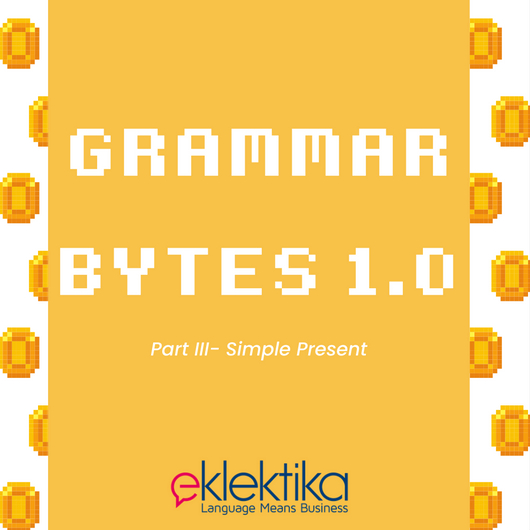
Verbal tenses can be quite challenging for beginners, that’s why we have created this article, to try and help you understand the differences in usage and in form.
Simple present
The simple present is used for:
For repeated actions or habits.
- I go to work every day.
- I take a nap in the afternoons.
For facts.
- They come from Japan
- Zebras have black and white stripes.
For things that are always / generally true.
- It gets very warm in summer.
- The president is the most important person in the country.
Form
| Pronouns | verb | Complement |
| I You We They | play | football |
| eat | pizza | |
| live | in Colombia |
3rd person form rules
To create sentences in the 3rd person singular (he/she/it) we must change the verbs by following these rules:
The spelling for the verb in the third person differs depending on the ending of that verb:
- For verbs that end in -O, -CH, -SH, -SS, -X,or -Zwe add -ES in the third person.
- go – goes
- catch – catches
- wash – washes
- kiss – kisses
- fix – fixes
- buzz – buzzes
- For verbs that end in a consonant + Y, we remove the Y and add -IES.
- marry – marries
- study – studies
- carry – carries
- worry – worries
NOTE: For verbs that end in a vowel + Y, we just add -S.
- play – plays
- enjoy – enjoys
- say – says
- For verbs with different endings than the mentioned above, we simply add ‘s’ at the end of the verb
- Eat – eats
- Sleep- sleeps
- Read – reads
| Pronouns | verb | Complement |
| He she it | plays | football |
| studies | English | |
| watches | television |
Asking questions
The simple present has 2 ways of asking questions:
- Verb to be
When using the verb to be, the form of the question is:
Am/are/is+ pronoun+complement+?
Ex: Are you a doctor?
- Without verb to be
When using other verbs to describe actions, we must use auxiliaries, as shown in part I of this series (click here to see that article).
| Auxiliaries | Pronoun | Verb | Complement |
| Do | I you we they | like | pizza? |
| Does | he she it | study* | French? |
| (*) When asking questions, the verb remains in “infinitive” form, which means no change is applied to it. | |||
Answering questions
- Do you like pizza?
(+) Yes, I do OR Yes, I like pizza.
(-) No, I don’t OR No, I don’t like pizza.
- Does she study French?
(+) Yes, she does. OR Yes, she studies* French.
(-) No, she doesn’t. OR No, she doesn’t study* French.
(*) Notice that when the auxiliary DOES is present, the verb stays in the infinitive form, but when it isn’t present, the verb must change.
We hope you enjoyed this article, please share it with friends and colleagues!
